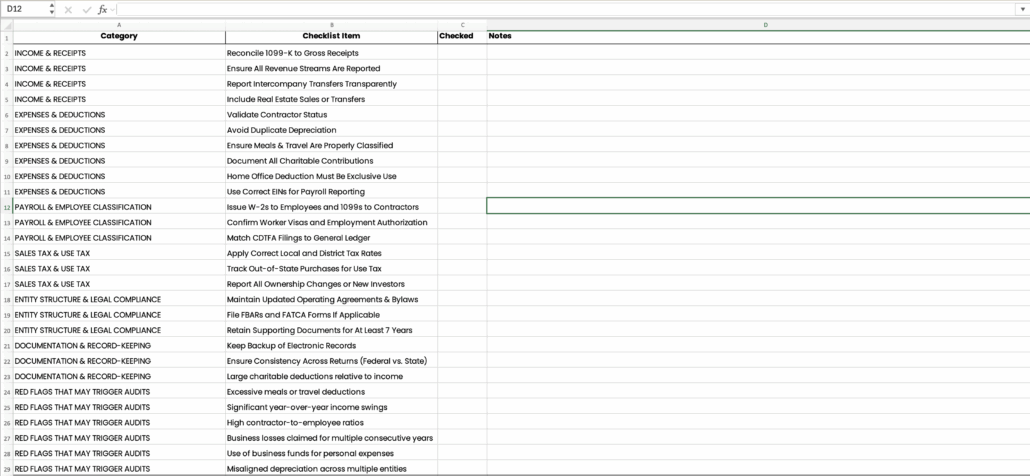How CPAs Can Proactively Manage Clients’ Audit Exposure
As a CPA, your clients rely on your accuracy, insight, and foresight. But when it comes to government audits, whether from the IRS, EDD, SBA, or CDTFA, your role extends beyond return preparation. You are often the first line of defense against audit triggers, and in many cases, the difference between a routine inquiry and a costly, years-long investigation.
At Milikowsky Tax Law, we do not prepare tax returns. We defend business owners in complex federal and California tax audits and investigations. When you partner with us, your clients gain attorney-client privilege during audits, while you retain your role as a trusted advisor.
Here are five ways you can help your clients minimize audit risk, and how we work alongside you when an audit arises.
1. Reconcile 1099-Ks With Gross Receipts on Tax Returns
IRS Mismatch Audits Are on the Rise
The IRS increasingly matches Form 1099-K (issued by credit card processors) to reported gross receipts on business returns. A mismatch, even if explainable, can trigger an audit.
What you should do:
- Reconcile all 1099-Ks with reported gross receipts.
- If there’s a legitimate variance (e.g., chargebacks, returns), document it with a clear written statement in the return workpapers.
- Maintain supporting documentation in the event of a Letter 6323 audit initiation.
Why it matters:
IRS Letter 6323 is often the first sign that an audit is underway. CPAs who prepare for this letter avoid scrambling to reconstruct records under pressure.
2. Scrutinize Contractor Classification Under Federal and State Law
1099 Misclassification Is a Red Flag
The IRS and EDD both review contractor classifications closely. If your client has more independent contractors than employees, audit risk increases.
Key action items for CPAs:
- Confirm that contractors are legitimate businesses (EIN, entity formation, website, invoicing). READ: HOW TO HANDLE CONTRACTOR MISCLASSIFICATION AUDITS
- Review where contractors are reported on the return:
- Schedule C: “Contract labor,” “commissions and fees,” “legal and professional”
- 1120S / 1065: COGS or “outside services” under “other deductions”
- Verify that 1099s were issued for all vendors paid over $600.
Note on California’s AB5 Law
Effective January 1, 2020, California’s AB5 legislation enforces a strict three-part “ABC” test for contractor status. Many businesses fail to meet this test, exposing them to retroactive payroll tax liability.
CPA Tip:
Failure to issue a required 1099 can allow EDD to extend an audit period from 3 to 8 years and assess harsh penalties.
3. Confirm Sales Tax Reporting Before a Business Sale
CDTFA Audits Often Arise From Tax Clearance Certificate Requests
If your client is selling a business, the buyer will request a Tax Clearance Certificate from the California Department of Tax and Fee Administration (CDTFA). This certificate often triggers a sales tax audit, even if the business has no history of noncompliance.
Before the certificate is filed:
- Confirm that sales tax collected and remitted is accurate and matches general ledger entries.
- Review whether the correct local and district tax rates were used.
- Verify that claimed exempt sales meet all CDTFA exemption documentation requirements.
4. Handle SBA PPP Loan Inquiries With Caution
Post-Funding Requests Signal Active SBA Investigations
If your client receives a post-funding document request from their bank or the SBA regarding a PPP loan, it is no longer just a verification, it may be a full investigation. READ MORE ABOUT LOAN DENIALS AND PPP AUDITS HERE
Risks include:
- Misstatements on loan applications
- Ineligible use of funds
- Misuse of EINs or cross-company fund transfers
- Employment verification inconsistencies
Best Practice:
If a bank requests documents post-funding, take caution! Involve a tax attorney immediately. The SBA has been referring questionable cases for potential criminal investigation. Our experience and insights into SBA PPP Loan denials has been that the longer the time-period since the denial, the more likely the case is to be exceedingly complex.
5. Partner With Legal Counsel to Protect Yourself and Your Client
Milikowsky Tax Law supports CPAs; we do not replace them. If your client receives:
- IRS Letter 6323
- EDD or CDTFA audit notice
- An inquiry tied to SBA PPP loans
…we step in to provide legal representation, protect your client under attorney-client privilege, and preserve the integrity of your work.
Key benefits of working with our team:
- We never prepare returns, so there is no conflict of interest
- We provide joint representation in IRS, EDD, and all other government tax audits as well as in SBA PPP denial cases.
- We manage criminal tax defense and cases where clients have inadvertently created additional audit exposure.
- We host CPA training events in our Encinitas location, quarterly.
Stay Ahead With a Partnership You Can Count On
Download our Compliance Checklist here to share this resource with your clients:
Audits are increasingly data-driven and aggressive. For CPAs, the best defense is a blend of precision in filings and access to legal counsel when government scrutiny escalates.
At Milikowsky Tax Law, we’ve helped hundreds of business owners navigate government audits, criminal tax investigations, and SBA scrutiny. We’re here to protect your client and your reputation.



